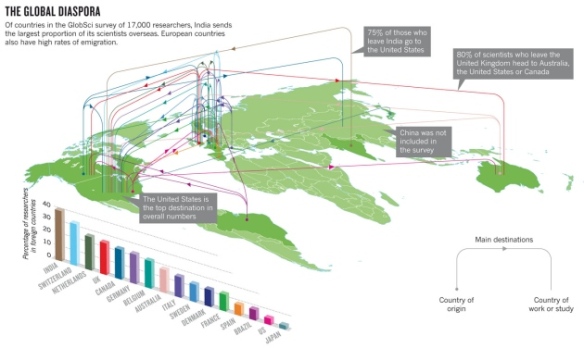In Notes from a Small Island the American author Bill Bryson describes his first ever visit to England. Eager to discover the country, but thoroughly unaware of local habits, he ends up spending the night on a bench in cold, foggy Dover, with a pair of underpants on his head as an improvised headwarmer. Despite this bumpy start, this night was the first spark of a love affair with the country and Bryson has since spent the majority of his adult life living in Britain.
I often think of this story, when I think about scientists on the move, starting a new position in a new country.

Moving country is a frequent feature of scientific life. This infographic from a 2012 Nature News Feature (Richard van Noorden: Global mobility: Science on the move) shows the most prominent trends in migration.
In many ways, these scientists resemble Bryson: they move, eager to discover not only exciting new science, but also a new place, it’s traditions and people. Also, even for seasoned “movers” there are always local procedures and issues that catch them unaware and unprepared. Unfortunately, unlike for Bryson, this time abroad often does not turn into a love affair with the new place – instead it remains a constant uphill struggle, battling with administration and customs that put scientists from abroad at a financial disadvantage or cause emotional stress. Even more annoyingly, often these problems could be resolved with minimal effort on behalf of the academic host institutions, making it all the more frustrating to be stuck in a one-(wo)man war against the system. To give an simple example: When I moved to France a few years ago, my university required a mandatory X-ray of the lungs within the first month, which could only be obtained from a short list of select doctors. I –like many other foreign postdocs – arrived with only rudimentary knowledge of French, only to discover that none of the shortlisted doctors spoke English! It was extremely discomforting having to strip to the waist in front of a rather severe nurse who treated me like an idiot, handled me less than gently and didn’t speak a word of English. Surely, it must have been possible to put at least one doctor on the list, who spoke English?!?
Intriguingly, having spoken to scientists elsewhere, I have found that many of us struggle with the same problems when we move abroad. So I have collected some of these below, together with some suggestions on how to fix them.
- Information, information, information.

Information by Magnus Akselvoll (via flickr)
One of the biggest problems for incoming scientists is the lack information: there is little of it, or it’s hidden somewhere in the endless depth of departmental websites, and even when it is provided it may come too late. The information in question may cover a breadth of topics, from help with temporary housing (does the institute provide any, if not are there any recommendations where to start looking?), through admin (eg in France an original copy of a birth certificate is needed – not a standard document for one to carry around) to help with settling an entire family in a new country (eg what childcare and schooling opportunities are available, at what cost and how long are wait lists). Often, the hosting lab goes out of it’s way to help with these issues, but if you are the first postdoc or first scientist from abroad in a given lab, labmates might not know the right answers. But a lack of information could be easily fixed by providing detailed, easy-to-navigate information pages on the institute website. This could either be a wiki that is updated by the resident foreign scientists, or a centrally maintained repository of information, as long as it is updated regularly and – ideally – a link is sent prior to arrival in a foreign country.
- Money talks: moving country can be an expensive process, starting with visa fees to travel costs, all the way to advances on rent or furnishing a new apartment. During this critical period every penny counts, and it can be extremely aggravating when bad management or communication on behalf of an institute puts scientists in a position that results in either cash flow problems, or even direct financial loss. For example, the habits for transferring the first salary differ from country to country. When I started work in Germany, we were given our first payment as a cheque on it’s first due date. Whereas in the US the first salary can only be transferred after obtaining a social security number, which takes approx 1-1.5 months. But host institutions are often unaware that their system may be very different from the system elsewhere: had I not asked about this issue before I moved to the US, I would not have “mobilized” enough cash to keep me going for such a long period of time.

Money by Pictures of Money (via flickr).
Or consider visa costs, which can add up to a fair sum, especially if a scientist has family on dependent visas. Ideally, institutions should carry these costs, but in cases where this is not possible, they should at least ensure that visas are issued for the maximum time possible, so scientists are not burdened unnecessarily with recurring fees (my current US university for example only issues 1-year visas, even if you have funding for multiple years). Institutes should identify recurring problems through discussions with foreign scientists, and should aim to resolve these either by disseminating necessary information, or by implementing policies that do not add to the financial burden of scientists.
- Institutional support:

Support by Got Credit (via flickr)
a large part of scientific training is creative problem-solving and independence. But sometimes there are problems that are too big for an individual person. Take the custom of the guarantor in France: this is a person who guarantees to pay rent if the tenant does not. Ideally, this should be a French person with substantial income, but alternatively, some banks offer to take on the role as a guarantor, if a substantial sum of money is deposited in an account. However, this latter option generally has an age limit of 30-35 years, so older postdocs who are looking for an apartment are not eligible. Individual scientists will find it difficult to circumvent these rules, but academic institutions with their prestige could arrange bulk negotiations with banks, supporting their workforce from abroad. In a completely different setting, academic institutes could support scientists in their effort to integrate locally by providing language courses for the native language. Frequently, such language courses are on offer, but I have repeatedly heard admin complain that scientists do not attend. From a researcher’s point of view I can say that this is not surprising: if the courses are organized in the middle of the day, possibly even on another campus, then they are essentially incompatible with a researcher’s schedule. What can institutions do? Well, here clearly a little input and initiative is required: they should identify recurring problems that are beyond the capacity of individual scientists (eg through consultation) and see if there is a way to resolve them through the organizational capacity of an institution.
In summary, where does that leave scientists from abroad? Well, I think it is perfectly fair for them to ask that they should not suffer potential disadvantages to their standard of living, their finances and their general wellbeing simply because they are foreigners. And (you may have noticed the recurring theme in my points above) I think this can be achieved if institutions up their game a little when it comes to communicating and tweaking existing procedures. This should require minimal effort on behalf of the institutions – but it’s definitely a case, where a little might go a very long way. I truly believe that the line between calling a new place a home away from home or feeling like a second class citizen is a thin one, and where one stands can often depend on whether scientists feel valued (in real terms) by their institution.

Good article. But universities/institutions do not care. They will say they are overstretched or let postdocs suffer if they chose this country or they have other things to worry about.
Thanks! Well, I kind of agree that many universities put off change as long as they can. But I think they are increasingly recognising the importance of postdocs (including international ones), and are starting to implement changes that help postdocs. Certainly, at my current institution the administrators are listening to our complaints and are trying to help, even if change is slow…